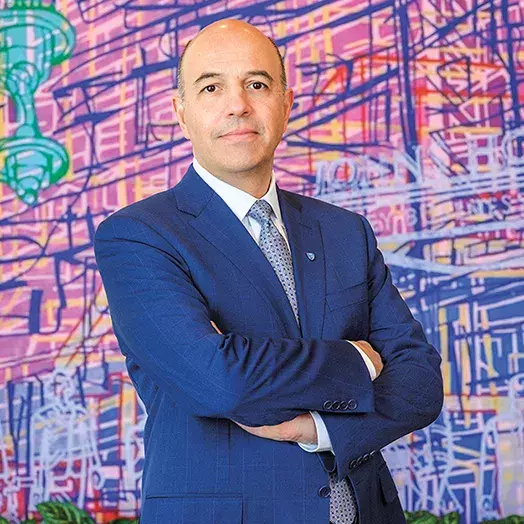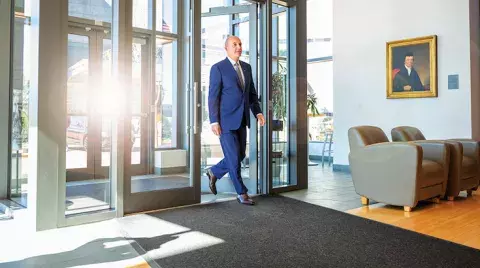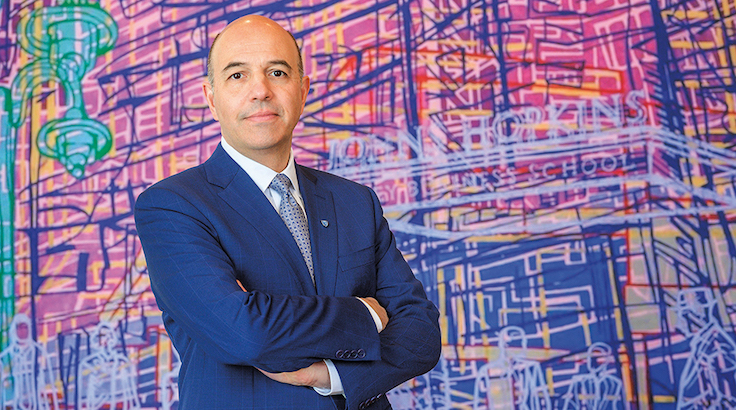Alexander Triantis arrives as the third dean of the Carey Business School, with ambitious goals designed to continue the school’s steep growth trajectory. (Blue jeans optional.)

The New Dean: Focused on the Future
This article originally appeared in the Fall/Winter 2019 edition of Carey Business magazine.
Let’s start with what might seem a small matter, to some.
This past September, at your first town hall meeting with Carey faculty and staff, you elicited probably the most enthusiastic round of applause ever heard at a Carey town hall when you announced that blue jeans would become optional wear on Fridays, removing the longstanding ban on staffers’ wearing denim.
What led you to that momentous decision?
Playing off our new “build for what’s next” tagline, I felt that the change was in line with dressing for what’s next. We are a school that is focused on the future of business, and the impact of technology and innovation on various industries. So it helps for our office environment to reflect how people work these days. Being more relaxed means you can be more creative. So the idea was to give everyone a little bit more freedom about what to wear, as long as we still have a professional look. We also know that casual Fridays or dress-for-the-day have become the norm at many companies.
“Everyone who is part of our business school community appreciated that businesses that are well managed can help to transform society in positive ways."
Alexander Triantis , Dean
After a few months on the job, what are your initial impressions of the Carey Business School?
They have been extremely positive. This is a unique business school not only because it’s young and still has a strong entrepreneurial spirit, but also because it has attracted faculty who took some risk in coming to a school that was not as well established as other business schools. So faculty have self-selected into an environment that is more forward-thinking, interdisciplinary, and collaborative than traditional schools. I’ve also noticed that when any new hires are being made here, a lot of attention is paid to choosing people who fit the Carey culture and will work to keep the entrepreneurial, collaborative spirit intact.
In the previous issue of Carey Business magazine, we interviewed Bernie Ferrari as he was about to step down as dean. As you begin your tenure as Carey dean, we’d like to ask you a question we asked him in that interview: Why do business schools exist, in the broadest sense? Why do we need them? What do they provide to the world?
I’m excited to be involved in business education because I believe in the power of both business and education. Everyone who is part of our business school community hopefully appreciates that businesses that are well managed can help to transform society in positive ways, and can help to address the many problems that we currently face globally.
Our programs certainly prepare students to be business leaders, who in turn can improve the way businesses are run and the impact they can have in the communities and the markets they serve. But I am also a firm believer that business programs can transform the lives of our students and alumni. Business schools provide an opportunity not only to learn knowledge and develop skills that impact one’s work and career, but also to learn more about oneself and grow as a person. Experiential learning in particular can magnify and accelerate that learning through experimenting, making mistakes, developing resiliency, and gaining confidence.
Business schools at top research universities also contribute scholarship that seeks to provide a deeper understanding of how businesses operate, and to provide guidance for how they can be better managed. This deeper thinking is shared with students, as well as with the broader academic and business communities.
Do you have a list of key goals you hope to achieve in this job?
First of all, I want to continue integrating Carey into Hopkins overall, consistent with the One Hopkins concept that President Daniels has articulated. So I am spending time talking to the other Hopkins deans about ways that Carey can connect with other schools through research and program collaborations. Students are increasingly looking for dual degree programs and other interdisciplinary offerings, and we are well positioned to offer a rich set of those opportunities.
Second, we have the opportunity to elevate Carey Business School’s reputation as the premier school for the business of health. A large proportion of our faculty are doing research, or have industry experience, in health-related disciplines, and some have cross-appointments at schools on the East Baltimore campus. Many of our students come from and/or go to health care and life sciences companies and organizations. We should continue to build on these strengths and the reputation of Hopkins overall in this space.
Ensuring that the student experience is as great as it can be is another critical goal. We are exploring all dimensions of the student experience to focus on continuous improvement.
I will also spend time to make Carey increasingly visible in the business community, especially in the Baltimore-Washington area, as well as in the academic community. Because we’re a relatively young school, it will take a while to develop a reputation. My goal is to accelerate that as quickly as possible so people think of the Carey Business School as one of the top business schools in the world.
Johns Hopkins to focus on the business of health care seems a surefire approach. But is it in any sense limiting, in that some prospective students might say, “I’m not interested in health care”?
That’s something we have to be very careful about. On the one hand, it’s important to increase our visibility in the business of health area. But we don’t want to crowd out the fact that we have many students who aren’t focused on pursuing careers in health-related industries. While we do have specialized courses and research programs focused on health, the majority of our courses and the interest of faculty are focused on more general functional knowledge and skills that apply to many industries. What’s exciting about teaching business today is the impact that technology and innovation are having on every industry. While our new full-time MBA pathway in health, technology, and innovation will provide selected students with an in-depth focus on managing innovation in health care and biosciences, our courses on change management, design thinking, and managing collaborative teams apply widely, as do many other courses.
“What's exciting about teaching business today is the impact that technology and innovation are having on every industry."
Alexander Triantis , Dean
Business education seems more affected by industry trends than many other fields of education. Take the MBA degree, which is “in” some years and “out” in other years. How do you deal with these shifting winds when planning programs for this year – and for three years down the road?
It’s become imperative these days to recognize the shifting winds and get ahead of them. That’s what we teach our students, and we, too, need to do the same. You have to be deliberate and recognize new market trends, both in business in general and the business education market specifically. As we did recently with our full-time MBA, you need to regularly re-examine what you’re doing and ask, “Does this degree portfolio, this combination of courses, still make sense?” You examine whether your programs are more or less relevant than they were in the past, or whether new programs are needed. The MS in Business Analytics and Risk Management is a great example of something we didn’t offer a few years ago, but we recognized the important need for it, and it has been very successful.
What do you see as the advantages and the disadvantages of Carey’s being such a relatively young school?
On the advantage side, I would include the ability to think in more creative and new ways, and to not be burdened by the mentality of “Well, we’ve always done it this way.” Our entrepreneurial spirit is a huge plus for this young school.
Second of all, because we’re new and many constituents are trying to learn more about us, this gives us a chance to tell our story and not have leaders in the business or academic community assume that we’re the same as other business schools. So as we are developing more state-of-the-art programs and approaches to research, we will grab the attention of more people.
On the flip side, one disadvantage is having to hold the flag up a little bit higher just to make sure we’re noticed and everybody is aware of us. Hopefully, fewer people over time will say, “I didn’t realize Hopkins had a business school.”
For the past decade, Carey has been described as a turnaround and a startup. Do you see the school as still having that status? Is it still on the runway, or is it anywhere close to “You are now free to move about the cabin”?
To pick up on that analogy, we are moving about the cabin; however, the business school environment, and I would say the educational space in general, is more turbulent than in the past, so we need to buckle down for some choppy weather. There is disruption as in most industries these days, and greater competition amongst schools to find the less bumpy altitude with fewer headwinds.
What was your reaction to the recent Business Roundtable declaration that a corporation should put the interests of the stakeholder above those of the shareholder, the opposite of their stance of the past two decades?
There has been much discussion about corporate social responsibility, including in our curriculum, but it was still relevant to see a public declaration by a prominent group of business leaders. As many have pointed out, however, this will have more bite if actually reflected in the compensation plans for executives, which are typically still focused on financial results. Regardless, I believe you can’t have highly successful financial results unless you have happy employees and happy customers, and the support of your community. We see increasingly that it’s not only shareholders who are activists but also consumers, particularly millennials, boycotting certain products if they don’t like what’s happening in your supply chain or how you’re treating your employees. And they’ll be vocal on social media as well. These issues are discussed and debated in a number of our courses, and not just in a single course focused on ethics and social responsibility. [For a faculty take on the Business Roundtable declaration, see A New Start or Business as Usual?]
What’s the future of online learning?
While we’re seeing softness in certain areas of the business education market, such as the full-time MBA, online enrollments are increasing rapidly. We’ll see more of that in the future, not only for our regular academic programs but also for Executive Education. People want to interact and learn from each other in a shared classroom, but the technology has matured to the point where that is possible online, where you’re not just watching a video but having much more interactive exchanges with peers and with faculty. The increasing acceptance of online learning by both employers and their employees, coupled with the flexibility people are looking for in their lives, will ensure that online learning is a highly viable and popular option going forward. It still needs to be coupled with some in-person interaction to take advantage of the networking opportunities of a business degree.
What’s your explanation for the recent slump in MBA applications across business education?
The slump is most noticeable in the full-time MBA market. One hypothesis focuses on how strong the job market is these days. In particular for those potential applicants who took on significant debt to support their undergraduate education, they’re thinking, “I’ve got a good job and can continue to work. Why not do an MBA part time or online rather than full time?” A full-time MBA is still highly appropriate for those looking to switch careers, and certainly for those coming from abroad hoping to launch their careers in the U.S. But while the job market is still hot, many won’t want to give up two years of income on top of the cost of a full-time degree. Many schools, including Carey, are offering generous scholarships to help address this situation.
At the September Town Hall, you spoke of Carey as “a lifetime home for education.” Can you expand on what you meant by that?
When you enroll at Carey, we don’t want to educate you only while you’re a student here, we also want to support your learning experience throughout your entire life or career. We’re starting to work more on this lifelong learning experience. It could involve providing webinars, online courses, executive education courses, or a boot camp to help you start up a new company 20 years after graduating, or coaching and networking when you’re thinking about switching careers. We know that our graduates are likely to have multiple jobs during their careers, and will need to be reskilled and upskilled. We hope to be able to provide that support for our alumni.
At at glance: Alexander Triantis
- Arrived August 2019 as third dean of the Johns Hopkins Carey Business School.
- Previously served as dean of the Robert H. Smith School of Business at the University of Maryland, 2013 to 2019.
- As Smith dean, promoted the development of cross-divisional research centers and initiatives focused on artificial intelligence, data analytics, enterprise and markets, ethics and regulation, financial and economic policy, and entrepreneurship. Also helped launch a number of dual degree programs
- and several graduate programs and certificates, including a top-ranking online MBA and an in-person and online MS in Business Analytics.
- BASc in engineering science, with honors and a pathway in electrical engineering, 1983; and MEng in industrial engineering, with a pathway in operations research/management science, 1984, University of Toronto.
- PhD in industrial engineering, with a pathway in finance, Stanford University, 1988.
- Chair of the finance department at the Smith School, 2006 to 2011. Joined finance faculty in 1995.
- Has published articles in numerous prestigious academic journals, and consulted and led training in corporate finance and valuation for multinational corporations and other large institutions.
- Has served as a committee member and vice president for global services for
- the Financial Management Association International, which develops and disseminates knowledge about financial decision making.
- In July 2019, began a three-year term on the board of directors of the Association to Advance Collegiate Schools of Business, a leading global accreditation association of business schools.

